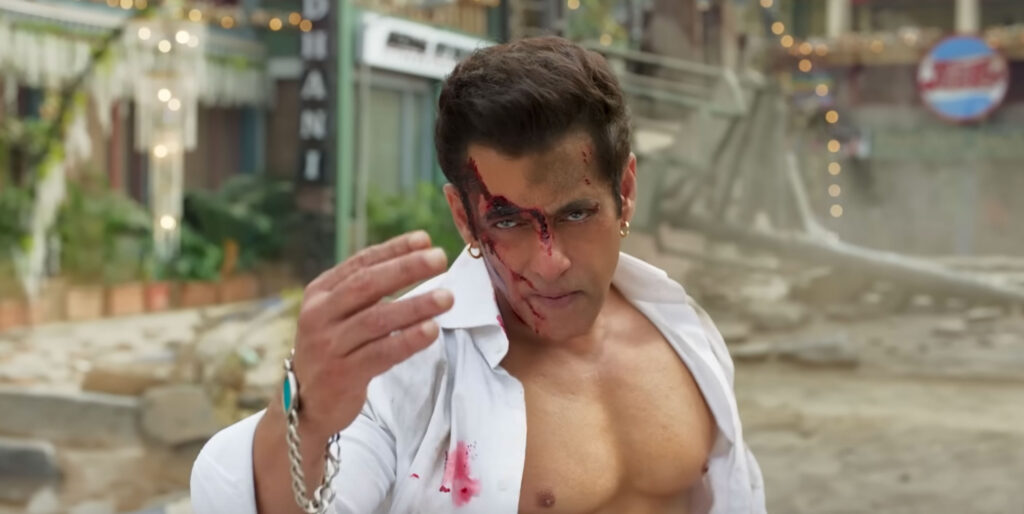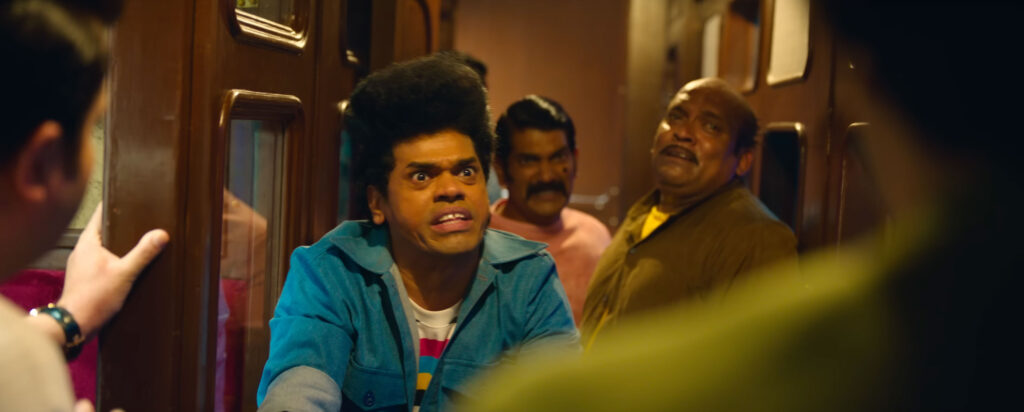April 26, 2023
by Carla Hay

Directed by Farhad Samji
Hindi with subtitles
Culture Representation: Taking place in India, the action film “Kisi Ka Bhai Kisi Ki Jaan” (a remake of the 2014 film “Veeram”) features an all-Indian cast of characters representing the working-class and middle-class.
Culture Clash: A marriage-phobic vigilante teams up with his three foster brothers to fight crime, including trying to stop a murder plot against the family of his love interest.
Culture Audience: “Kisi Ka Bhai Kisi Ki Jaan” will appeal primarily to people who are fans of “Veeram,” the movie’s headliners, and mindless action movies that are aggressively stupid.

Get ready for your hearing and your brain cells to be assaulted when watching the loud, bombastic and idiotic “Kisi Ka Bhai Kisi Ki Jaan.” Note to filmmakers who make this type of trash: Stop the madness. Cast people who can act. It’s the same junk: a ‘hero’ in fake action scenes, a pretty love interest, revenge plots, murders. No one respects overly long, boring, and unoriginal garbage.
Directed by Farhad Samji (who co-wrote the mindless screenplay with Sparsh Khetarpal and Tasha Bhambra), “Kisi Ka Bhai Kisi Ki Jaa” is yet another unnecessary remake that is inferior to the original movie. “Kisi Ka Bhai Kisi Ki Jaa” (which means “someone’s brother, someone’s lover” in Hindi) is a remake of the 2014 Tamil-language film “Veeram.” There’s so much bad acting in “Kisi Ka Bhai Kisi Ki Jaa,” you have to wonder if the filmmakers made these choices as a way to torture viewers, who will already have their endurance tested by the movie’s 144-minute total running time and the excessively loud sound design throughout the entire film.
In “Kisi Ka Bhai Kisi Ki Jaa,” the dimwit protagonist with a lot of muscles but very little charm is Bhaijaan, nicknamed Bhai (played by Salman Khan), a never-married bachelor who doesn’t seem to be doing anything with his life but being a violent vigilante who fights crime in his home city of Delhi. As shown later in the movie, Bhai has this to say about men who cry tears when expressing emotions: “Crying is for losers.” Bhai has three sidekicks in his crime-fighting efforts: Ishq (played by Raghav Juyal), Moh (played by Jassie Gill) and Love (played by Siddharth Nigam), who all call themselves brothers of Bhai.
These four men are actually not biologically related to each other. It’s revealed in a flashback shown early on in the movie that Ishq, Moh and Love were orphans. Bhai rescued Ishq, Moh and Love from an orphanage fire when Ishq, Moh and Love were about 6 or 7 years old, and Bhai was about 16 or 17. Bhai raised Ishq, Moh and Love as if they were his brothers.
In the flashback, Bhai only looks about 10 years older than Ishq, Moh and Love. In the present day, Bhai looks about 20 to 25 years older than his “brothers.” It’s one of many examples of how the movie is sloppily made. Salman Khan’s mother Salma Khan is the main producer of “Kisi Ka Bhai Kisi Ki Jaa,” which is obviously a family vanity project. It’s a lot easier to get cast in the starring role of movie, no matter how terrible your acting is, if you have a parent who’s paying for the movie to get made.
The brotherly bond between these four men is so tight, it’s affected all of their love lives. Bhai is commitment-phobic when it comes to love and romance. He has said he never wants to get married. Ishq, Moh and Love crave Bhai’s approval, so they say the same things. However, Ishq, Moh and Love secretly have girlfriends, who are growing frustrated that they can’t be open about their respective relationships with Ishq, Moh and Love.
Ishq’s girlfriend is Sukoon (played by Shehnaaz Gill), Moh’s girlfriend is Muskaan (played by Palak Tiwari), and Love’s girlfriend is Chahat (played by Vinali Bhatnagar). Sukoon, Muskaan and Chahat don’t have a lot of screen time. But when they do appear, it’s only to whine about their love lives.
In fact, “Kisi Ka Bhai Kisi Ki Jaa” cares so little about women, the only women characters with significant speaking roles in the movie mainly exist for the purpose of being love interests for the men. It’s all very backwards and unimaginative filmmaking, just like many other aspects of this very outdated-looking movie.
Ishq, Moh and Love want to go public with their girlfriends, so they hatch a plot to find a girlfriend for Bhai. The idea is that if Bhai falls in love, he will ease up on his rigid view that these four “brothers” cannot have serious love relationships. Ishq, Moh and Love know that Bhai had a serious romance when he was younger with a woman named Bhagyalakshmi, nicknamed Bhagya.
Ishq, Moh and Love heard that Bhagya currently lives in Mumbai. And so, these three “Brothers” decide to find her and play matchmaker. But these three dolts don’t do what most people in modern society would do: an Internet search to find out first what Bhagya’s relationship status is. When they get to Mumbai, they find out that Bhagya is happily married with a child. Once again, it’s outdated filmmaking and stupidity on display.
This matchmaking farce just wastes time in this already bloated movie. The next unrealistic thing that Ishq, Moh and Love do is try to find a woman named Bhagyalakshmi, nicknamed Bhagya, who is attractive enough to date Bhai. That’s how Bhai meets Bhagyalakshm “Bhagya” Gundamaneni (played by Pooja Hegde), who works as an “antiques researcher.” Bhagya, who also calls herself “Bhaggy,” lives in Andhra Pradesh, India.
Bhai and Bhagya have their “meet cute” moment when she bumps into him at an outdoor market in Hyderabad, and she drops an antique vase that goes crashing on the ground. Bhai is immediately smitten with the new Bhagya in his life, but she predictably plays hard-to-get. Bhagya is probably one of the most annoying characters in the movie because she’s a stereotype of a helpless and ditzy “damsel in distress” who’s waiting to be rescued by a male love interest. It doesn’t help that Hegde’s terrible acting is hard to watch.
Bhagya tells Bhai up front that any man she dates has to get the approval of her brother Balakrishna Gundamaneni (played by Venkatesh), who is domineering and overprotective. Balakrishna, who is married with a young daughter, also hates violence. And since Bhai leads a very violent life, much of the movie is about his trying to hide the truth from Bhagya and her family.
Every action movie at least one villain. And in “Kisi Ka Bhai Kisi Ki Jaa,” there are two villains: First, there is Mahavir (played by Vijender Singh), who is the type of villain who wears a lot of business suits. Mahavir hates how Bhai and his sidekicks are ruining his criminal enterprises, so he wants to kill all four of these vigilantes.
The other villain is Kodati Nageshwar (played by Jagapathi Babu), a thug who wants to kill Balakrishna and all of the members of Balakrishna’s immediate family. This revenge killing was already planned before Bhai and Bhagya started dating each other. The reason for this murder plot is so obvious, because the movie has no subtlety in showing and repeating how fanatical Balakrishna is about being against violence.
“Kisi Ka Bhai Kisi Ki Jaa” has some standard musical numbers which further drag out an already vapid story. The songs in these musical scenes are forgettable and trite. Salman Khan is not a skilled dancer, so it’s somewhat amusing to see him try to keep up with the backup dancers in these musical scenes. That amusement is slight though, and it will just give way to more irritation as “Kisi Ka Bhai Kisi Ki Jaan” keeps piling on scenes that are idiotic and don’t really go anywhere, including some scenes that have obnoxiously blatant product-placement shilling of Pepsi.
Filmmakers will continue to churn out dreck like “Kisi Ka Bhai Kisi Ki Jaan” if they think it will make them any money. That doesn’t mean that people who like movies automatically have to watch this type of relentless insult to viewers’ intelligence. Avoid “Kisi Ka Bhai Kisi Ki Jaan” at all costs. Your brain cells will thank you.
Zee Studios released “Kisi Ka Bhai Kisi Ki Jaan” in select U.S. cinemas and in India on April 21, 2023.


